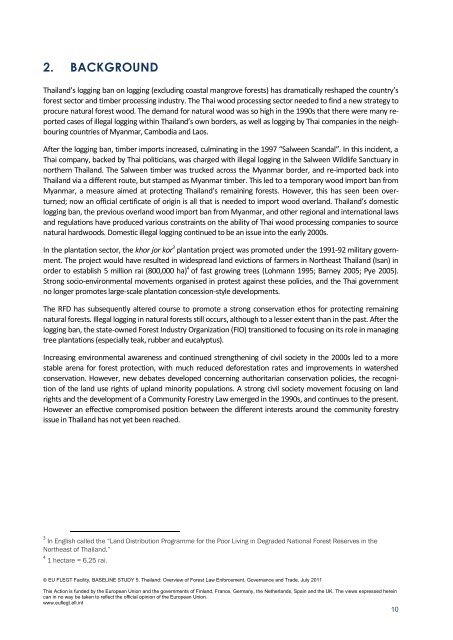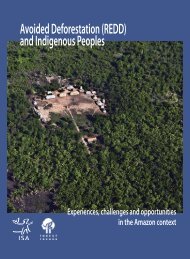BASELINE STUDY 5, Thailand - Forest Trends
BASELINE STUDY 5, Thailand - Forest Trends
BASELINE STUDY 5, Thailand - Forest Trends
You also want an ePaper? Increase the reach of your titles
YUMPU automatically turns print PDFs into web optimized ePapers that Google loves.
2. BACKGROUND<br />
<strong>Thailand</strong>’s logging ban on logging (excluding coastal mangrove forests) has dramatically reshaped the country’s<br />
forest sector and timber processing industry. The Thai wood processing sector needed to find a new strategy to<br />
procure natural forest wood. The demand for natural wood was so high in the 1990s that there were many reported<br />
cases of illegal logging within <strong>Thailand</strong>’s own borders, as well as logging by Thai companies in the neighbouring<br />
countries of Myanmar, Cambodia and Laos.<br />
After the logging ban, timber imports increased, culminating in the 1997 “Salween Scandal”. In this incident, a<br />
Thai company, backed by Thai politicians, was charged with illegal logging in the Salween Wildlife Sanctuary in<br />
northern <strong>Thailand</strong>. The Salween timber was trucked across the Myanmar border, and re-imported back into<br />
<strong>Thailand</strong> via a different route, but stamped as Myanmar timber. This led to a temporary wood import ban from<br />
Myanmar, a measure aimed at protecting <strong>Thailand</strong>’s remaining forests. However, this has seen been overturned;<br />
now an official certificate of origin is all that is needed to import wood overland. <strong>Thailand</strong>’s domestic<br />
logging ban, the previous overland wood import ban from Myanmar, and other regional and international laws<br />
and regulations have produced various constraints on the ability of Thai wood processing companies to source<br />
natural hardwoods. Domestic illegal logging continued to be an issue into the early 2000s.<br />
In the plantation sector, the khor jor kor 3 plantation project was promoted under the 1991-92 military government.<br />
The project would have resulted in widespread land evictions of farmers in Northeast <strong>Thailand</strong> (Isan) in<br />
order to establish 5 million rai (800,000 ha) 4 of fast growing trees (Lohmann 1995; Barney 2005; Pye 2005).<br />
Strong socio-environmental movements organised in protest against these policies, and the Thai government<br />
no longer promotes large-scale plantation concession-style developments.<br />
The RFD has subsequently altered course to promote a strong conservation ethos for protecting remaining<br />
natural forests. Illegal logging in natural forests still occurs, although to a lesser extent than in the past. After the<br />
logging ban, the state-owned <strong>Forest</strong> Industry Organization (FIO) transitioned to focusing on its role in managing<br />
tree plantations (especially teak, rubber and eucalyptus).<br />
Increasing environmental awareness and continued strengthening of civil society in the 2000s led to a more<br />
stable arena for forest protection, with much reduced deforestation rates and improvements in watershed<br />
conservation. However, new debates developed concerning authoritarian conservation policies, the recognition<br />
of the land use rights of upland minority populations. A strong civil society movement focusing on land<br />
rights and the development of a Community <strong>Forest</strong>ry Law emerged in the 1990s, and continues to the present.<br />
However an effective compromised position between the different interests around the community forestry<br />
issue in <strong>Thailand</strong> has not yet been reached.<br />
3 In English called the “Land Distribution Programme for the Poor Living in Degraded National <strong>Forest</strong> Reserves in the<br />
Northeast of <strong>Thailand</strong>.”<br />
4 1 hectare = 6.25 rai.<br />
© EU FLEGT Facility, <strong>BASELINE</strong> <strong>STUDY</strong> 5, <strong>Thailand</strong>: Overview of <strong>Forest</strong> Law Enforcement, Governance and Trade, July 2011<br />
This Action is funded by the European Union and the governments of Finland, France, Germany, the Netherlands, Spain and the UK. The views expressed herein<br />
can in no way be taken to reflect the official opinion of the European Union.<br />
www.euflegt.efi.int<br />
10
















